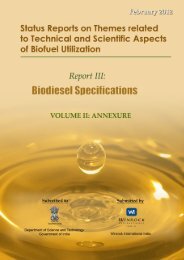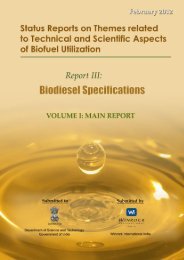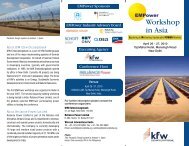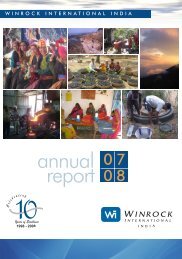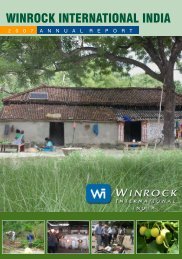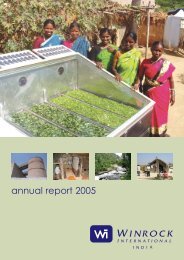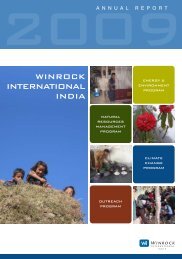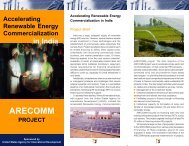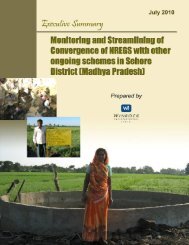IssuE 8 â ApRIl â JuNE 2011 - Winrock International India
IssuE 8 â ApRIl â JuNE 2011 - Winrock International India
IssuE 8 â ApRIl â JuNE 2011 - Winrock International India
You also want an ePaper? Increase the reach of your titles
YUMPU automatically turns print PDFs into web optimized ePapers that Google loves.
Energy Plantations<br />
requirements through a series of<br />
backward integration steps involving<br />
principles of electrical engineering,<br />
management and forestry.<br />
An Energy Plantation (Courtesy, EPPI)<br />
Role of Urban Professionals<br />
Where do Urban Professionals<br />
figure in this scheme of things Their<br />
entry is best facilitated by one of<br />
the outstanding aspects of initiative<br />
taken by MNRE. It is the scalability.<br />
The initiative facilitates setting up<br />
Power Stations with capacities of<br />
few hundred kW and the associated<br />
energy plantation of 15-20 acres<br />
for fuel security. The initiative also<br />
facilitates setting up Power Stations<br />
with capacity of up to 2 MW and<br />
the associated energy plantation of a<br />
few hundred acres for fuel security.<br />
It is this wide range of business<br />
possibilities and business prospects<br />
that is drawing the attention of urban<br />
professionals with disposable incomes.<br />
The “Eco-System” referred to in the<br />
very first paragraph of this article is<br />
the Cause Célèbre’ developed by EPPI.<br />
In the process of developing this Eco-<br />
System, the company came across<br />
the unique nature and advantages<br />
of Urban Professionals taking up the<br />
Green Energy Initiative. Following<br />
text is a result of years of experience,<br />
convictions and proof. It augurs well<br />
at this juncture to declare that EPPI<br />
consists of professionals none of whom<br />
had any exposure or experience in<br />
forestry or agriculture. They started<br />
with this disadvantage and they found<br />
over a period of time that this lack<br />
of expertise turned out to be to their<br />
advantage in terms of innovation and<br />
non-conformity.<br />
Current day urban professionals<br />
bring in the planning and work<br />
culture not common in the world of<br />
forestry and agriculture. Best of their<br />
attitudes stems from their quest to<br />
make the establishment recursive<br />
for performance excellence. Applied<br />
R&D, formal management systems<br />
like reviews, standard operating<br />
procedures, computerization,<br />
documentation etc. are some of the<br />
elements of the standard building<br />
blocks of their recursive approach. In<br />
addition to minimizing subjectivity in<br />
all aspects of forestry development,<br />
they could improve predictability of<br />
forest growth tremendously and the<br />
downstream predictability of feedstock<br />
availability to the power stations. This<br />
entailed a very innovative approach<br />
of converting the Power Station<br />
Some of the outstanding advantages<br />
urban professionals bring in, in the<br />
field of energy plantations leading to<br />
Power are enumerated below:<br />
°° Reduction of cycle time in almost<br />
all activities.<br />
°° Elimination of rework to a large<br />
extent.<br />
°° Seeking and inclusion of new<br />
technologies and professional<br />
disciplines and making bioenergy a<br />
multi-disciplinary approach.<br />
°° Lack of fear (comparable) of failure<br />
in experimentation.<br />
°° Social inclusion as a part of<br />
business execution rather than as<br />
charity or as CSR.<br />
°° Innovation in technologies as well<br />
as management practices.<br />
°° Out of the Box strategic thinking<br />
°° Formalization of the age-old<br />
wisdom of rural workers in the<br />
form of documentation and<br />
Standard Operating Procedures.<br />
The attitudes and approaches<br />
of educated urban professionals<br />
enumerated here are assets in the<br />
field of energy plantations for Power.<br />
Some of the achievements of EPPI bear<br />
testimony to the results of possessing<br />
these assets.<br />
°° Cost of Biomass (feedstock) is<br />
anywhere between 60 to 70% of<br />
the cost of production of one unit<br />
of electricity. EPPI is able to bring<br />
this cost down to 15 to 20%. One<br />
can appreciate the profitability in<br />
business in such a case.<br />
°° Predictability of the feedstock<br />
supply (lack of which haunted the<br />
Power Stations for so long) can be<br />
achieved with all round benefits.<br />
°° In their 300 acres of energy<br />
April-June <strong>2011</strong><br />
7




